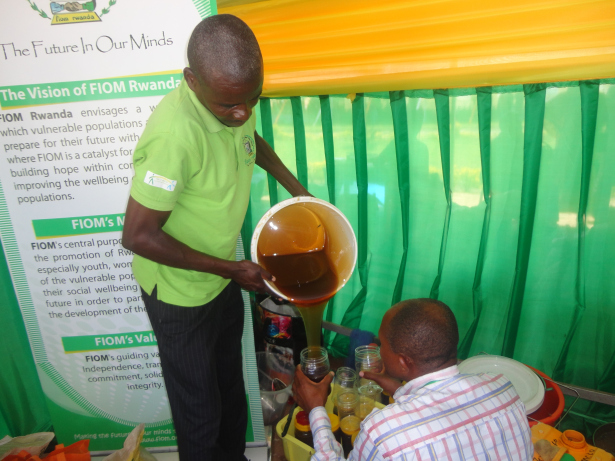
The 13thNational Agriculture Show ended on Wednesday July 3rd2018 at Mulindi show ground. Organized by the Ministry of Agriculture and Livestock, the show brought together over 150 participants.
With the support of FIOM Rwanda, beekeeping cooperatives from the Eastern Province attended the exhibition. Reflecting back on how successful their participation was, they thank FIOM Rwanda and Ikiraro Program for supporting them to attend.
From their testimonies, participation to the National Agriculture Show was a highly beneficial exercise, both in widening their business network and also in making their products known by consumers from various corners of the Country. The cooperatives which were represented at the Agri- show are Dutuburubuki and Kopanyayaka from KayonzaDistrcit, as well as COPROMI from Gatsibo District.
Innocent Nshuti who represented from Kayonza revealed that together with his colleagues, they sold out 250 Kgs at premium good price of 4,000 Rwf/kg of honey, when the normal price is of 3,000Rwf. He further pointed out that the exhibition was the ideal occasion to explain how beneficial beekeeping is for those who practice it.
Speaking at the occasion, Chantal NYIRANSENGIMANA, who represented COPROMI beekeepers cooperative from Gatsibo district said that they benefited a lot as they took contacts of people who want to be trained in beekeeping as well on how to make products other than honey, such as body lotion jelly and candles, produced from beekeeping sub products. This was an amazing experience for visitors of FIOM Rwanda stand, considering the fact that those by products are normally discarded. Cooperatives sponsored by FIOM Rwanda use those by-products to make jelly which is used for healing skin diseases.
Participating beekeepers also noted that their honey was being very much preferred by customers, despite the existence of many other beekeepers attending the exhibition. The reason for that was the fact that honey from FIOM Rwanda sponsored cooperatives was natural, and customers were very well treated, with explanations given on how honey is processed.Customers were able to observe honey extracting machines,and honey extraction could be done on site for demonstration purposes. This enhanced trust that what they were buying was not a not mixed honey, but natural honey, as opposed to what is observed in many other instances.
Business people of different calibers also visited the stand and discussed with beekeepers. Those contacts will nurture into sound sale agreements, since they agreed to maintain contact and figure out how they can work together with the respective cooperatives. With such arrangements, the cooperatives’ honey will soon be sold in various parts of the country, other than the Eastern Province.